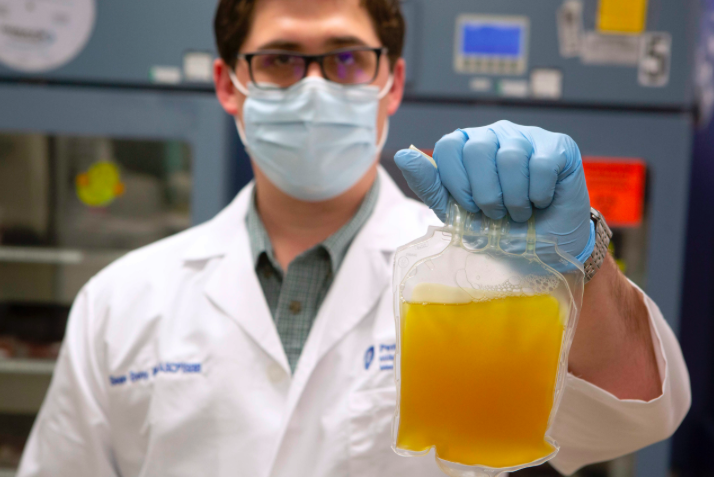
April 17, 2020
 Courtesy/Penn State Health
Courtesy/Penn State Health
Sean Erony, chief technologist for the blood bank in the Department of Pathology and Laboratory Medicine at Penn State Health Milton S. Hershey Medical Center, holds up a bag of plasma to be used in an experimental treatment for COVID-19 patients.
Penn State Health this week enrolled its first COVID-19 patient in an experimental treatment program using convalescent plasma from an individual who has recovered from a previous coronavirus infection.
The program, facilitated by the Mayo Clinic and the U.S. Food and Drug Administration, seeks to determine whether infusions of blood plasma from recovered COVID-19 patients can deliver the protective antibodies necessary to fight the virus.
“Plasma contains antibodies that may help patients being treated for COVID-19 recover,” said Dr. Melissa George, interim chair of pathology at Penn State Health Milton S. Hershey Medical Center. “Those antibodies may give a patient’s immune system a boost until they can develop their own immune response.”
Patients across the United States are scrambling for access to the experimental therapy, which is generally considered low-risk in the treatment of other illnesses. It has been used to treat H1N1 influenza , SARS and MERS patients during prior outbreaks.
Whether convalescent plasma has substantial benefits for COVID-19 patients has not yet been determined. The Penn State Health Program is collecting plasma from eligible donors to treat patients at both Milton S. Hershey Medical Center and St. Joseph Medical Center in Reading.
"Faculty in the Department of Medicine and the staff at the Milton S. Hershey Medical Center are working tirelessly at the front line to provide the best care possible utilizing the latest advances in therapy for COVID-19 patients that come to our hospital,” said Dr. Thomas Ma, professor and chair of the Department of Medicine at Penn State College of Medicine. “Convalescent plasma therapy gives front line providers another tool that may potentially aid in the treatment of critically ill COVID-19 patients.”
A similar study on convalescent plasma also is underway at Penn Medicine in Philadelphia, where researchers are investigating outcomes in hospitalized patients with severe COVID-19 cases, including some in intensive care units.
At Penn State Health, researchers are prioritizing patients with severe or life-threatening illness.
“As more patients around the country recover and access to plasma from those who have recovered increases, we hope to expand the treatment to all patients hospitalized with COVID-19," Gunther said.
Penn State Health patients who may be eligible to donate their plasma toward this effort are being contacted by medical and nurse practitioner students who will help them register with the Red Cross.
Potential donors typically must have a previous positive test result for COVID-19, a follow-up negative test, and be symptom-free for 14 days. In the absence of a negative test result, an issue compounded by limited availability, 28 days without symptoms after a previous infection may be required to donate plasma.
Two small research studies out of China provided promising results that suggest convalescent plasma may be helpful in treating COVID-19 patients. Many of the patients in the Chinese studies also were treated with antiviral drugs, making the results inconclusive.
The goal of the current programs underway in the United States is to build a more complete and controlled set of data on the effectiveness of convalescent plasma for COVID-19 patients.